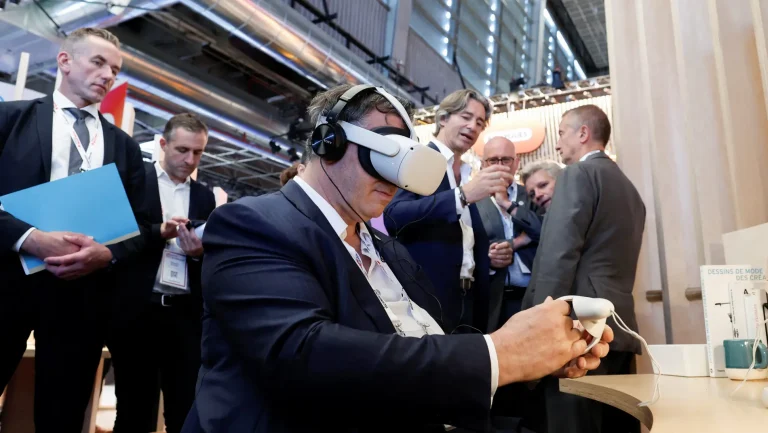
The Metaverse Standards Forum, a collection of big tech companies working to establish guidelines for metaverse platforms, has been in the planning stages for some time, but the timing of its launch this week is unfortunate. Bitcoin, the leading cryptocurrency of the metaverse, is down nearly 60% in the last two quarters, along with much of the stock market, as inflation and interest rate hikes pinch consumers. Similarly, employers are pressing workers to move away from the virtual and remote work dynamics that have gained currency over the last two years.
Ever since Mark Zuckerberg helped popularized the term metaverse last year to describe the intersection of gaming, virtual work, and socializing, assisted by augmented reality (AR), virtual reality (VR), and crypto, the space has been under extreme critical scrutiny from skeptics. Some of that negative attention is likely due to Zuckerberg’s own somewhat damaged profile as the CEO of Meta. But there are others who point to a number of concerns around the business viability of what some are calling the next phase of the internet.
“For business leaders versus broader consumer adoption, I would say it’s the headset,” says Andrew Hawken, the co-founder and CEO of UK-based VR startup Mesmerise. “It often presents a very powerful psychological barrier. It’s not like learning to use an iPhone or iPad—VR technology makes first-time users feel vulnerable and even a bit silly as they navigate the virtual world. So you can imagine why there’s some hesitancy from senior executives to put on a headset to lead meetings with their colleagues and clients in the metaverse.”
Building the metaverse in the midst of economic tumult has increased the difficulty of taking it mainstream
On June 17, the Nasdaq stock exchange held its first opening bell event in the metaverse, highlighting how seriously Wall Street is taking the new technology. And just days later, on June 20, Zuckerberg offered another look at the next version of the Quest VR headset, just a couple of months after launching Meta’s first brick-and-mortar store devoted to selling and demonstrating metaverse products.
With disruption in our DNA, we are honored to have collaborated with @Journeydotworld and @CoreGames to bring the @NasdaqExchange to the #Metaverse. ✨
We look forward to continuing to find innovative ways to make the capital markets more inclusive and accessible to all. pic.twitter.com/sTli7nSVMT
— Nasdaq Exchange (@NasdaqExchange) June 18, 2022
Meanwhile, this week in New York City, the NFT NYC blockchain conference is being held as billions are being lost (at least for now) by crypto speculators like Michael Saylor, layoffs are hitting Coinbase, the space’s most high-profile exchange, and NFT theft is running rampant.
Currently, things aren’t looking great for the already vague future of the metaverse as its slow growth and current economic conditions increase the number of doubters questioning its relevance. Still, Citi has projected the metaverse be worth up to $13 trillion by 2030, and new multimillion dollar investments from the likes of accounting firm KPMG ($30 million), crypto exchange Binance ($500 million, with the help of DST Global Partners and Breyer Capital), and venture capital firm Andreessen Horowitz ($600 million) pour into the space nearly every month.
One of the biggest metaverse companies, Apple—a longtime AR leader that is rumored to be launching a VR headset in 2023—hasn’t joined the Metaverse Standards Forum yet, which begins formally meeting in July. But the absence of one big tech brand doesn’t seem to be slowing the organization’s initiatives, which could eventually influence all companies launching their version of the metaverse.
“Slowly, companies are coming to realize that they will need a better way to work than teleconferencing,” says Hawken of the metaverse, “especially [companies] with global, hybrid teams.”
The new metaverse organization may appear as vague as its name, but it could impact big tech’s immersive path
Despite these challenges, the Metaverse Standards Forum is pushing forward with an impressive list of members that includes Adobe, Epic Games, Meta, Microsoft, Nvidia, Wayfair, IKEA, Qualcomm, Sony, Alibaba, Huawei, and Unity. And while the names associated with the effort are largely leaders in the tech industry, the organization is free to join, and will not enforce a strict set of standards for companies building metaverse platforms. Given that somewhat loose framework, some may question what the true purpose of the organization is, since there are no real world consequences or tangible rules around the association and its membership.
“[It’s a] venue for building industry consensus on critical requirements for metaverse standards and exercising real-world interoperability with ‘plugfest’ projects,” says Khronos Group president Neil Trevett, who also serves as the chair of the Metaverse Standards Forum. “The Forum is not trying to dictate technologies or business models to the industry, it’s actually the reverse, the standards organizations in the Forum are seeking industry input on requirements to help steer their standardization activities. And of course, the Forum cannot force any company to use any standard—companies will choose to use standards that add value to their business.”